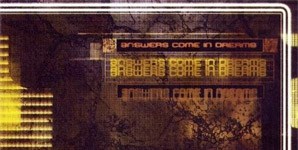Review of Answers Come In Dreams Album by Meat Beat Manifesto
On the face of it, Meat Beat Manifesto - effectively Jack Dangers since his move to San Francisco at the start of the 90's - represent something of an anachronism. Of a generation coming into adulthood when rave culture was perceived by the establishment as a GENUINE THREAT TO ORGANISED SOCIETY, the era's obvious nudge-wink drug references, dummies and whistles seem more like quirky props now. Maybe they were. But media scaremongering (Sound familiar?) and the authorities inability/unwillingness to understand led to the Criminal Justice Bill, a piece of legislation which proved to the likes of Dangers once and for all that the notion of personal freedom in Britain had become largely conceptual.

With its progenitor taking inspiration from the early sonic reprobates like Throbbing Gristle and Cabaret Voltaire, MBM's music has remained largely off the radar since flirting with the mainstream on 1992's Satyricon. Dangers obsession with multi-media, particularly video, has often provided a more subversive counterpoint to his music, itself a wide ranging mix of techno, dub, breaks and IDM.
Despite his eclectic palette, more recent MBM offerings have leant more towards dubstep, the shadowy laptop based urban neo-classicism made for concrete and corrosion. Dangers is adamant that Answers Come In Dreams is not a dubstep record, stating in interview that.. "If I tried to make a dubstep album purposefully, it would end up sounding completely different", but listeners with less history may be left thinking quite the opposite.
The evidence to the contrary begins immediately after the angular opener 010130, its successor Quietus being full of drops and a lilting breakbeat that reinforce the belief that the boffin doth protest too much. Closer Chimie Du Son equally peppers the listener with an inelastic snapping break, whilst the occasional harmonious bleep line struggles to reach an opaque and glitchy surface.
There is an argument that dubstep in itself should be the property of a different generation of subterranean nighthawks, but Dangers is quick to disprove any notions of bandwagon jumping. First come the snippets of spoken word cut ups, disjointed and uncomfortable a la William Burroughs, phrases feeling like the shavings of a nightmare as used on the dystopian Token Words. Then there's the heavily atmospheric ambient darkness of Please or Waterphone, each pulsing disjointedly like soundtracks to a film you watch from behind the sofa. That the standout track #zero is in fact a relatively more straightforward journey into the smeary low countries acid pads which characterised the world before repetitive beats made you an outlaw is possibly ironic, but not really surprising. Jack Dangers has perpetually it seems been genre splitting, leaving us unsure of his motivations, personal politics and resolutely denying us access to his sunny side. His music has always been ambiguous, and you sense this suits him. The fact that the artists of now have only just caught up means that Meat Beat Manifesto can continue directing operations from the underground, their influence anonymous but always pervasive.
Andy Peterson
Site - http://www.meatbeatmanifesto.com

